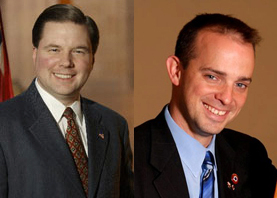McKevitt, Devaney vie for Assembly seat
Race in 17th District focuses on state’s future
In the race in the 17th Assembly District, incumbent Tom McKevitt (R-East Meadow) and Democratic challenger Tom Devaney, of East Williston, have something more in common than their first names.
McKevitt and Devaney both say they want to see young people stay in New York instead of packing their suitcases for states like North Carolina, Texas, Georgia and Pennsylvania.
McKevitt, 39, who has two toddlers, said he is not so confident that his kids will stay in the struggling state until major changes are made. Whenever he meets with families in the district, he said, that is a common theme.
“Their attitude is, their child doesn’t have a job around here,” said McKevitt, who grew up in East Meadow and still lives there. “That worries people more than anything else.” Devaney, 33, also lives in the same community where he was raised. Though he said he loves his hometown, he debated leaving and pursuing other interests as a young adult.
“People can’t afford to live in this area anymore — everyone is moving away,” Devaney said. “I myself was close to packing up … I was going to join the two million [people] leaving New York state.”
McKevitt and Devaney agree that the implementation of a cap on property tax increases could be an important step toward relief.
Devaney points out that his status as a Democrat could potentially give him more pull in the Assembly majority. The property tax cap bill, which would prohibit school districts from increasing spending by more than a certain percentage, has been passed by the Senate but not even entertained by the Assembly.
“I think if I was elected, we would be in these Democratic caucus meetings working with both sides of the aisle, working to see if we can get both votes to pass,” Devaney said.
McKevitt agrees with the institution of a property tax cap, though he added that it is “not the end to all problems.” In fact, McKevitt and the Republican minority conference in the Assembly offered their own proposal for a 4 percent cap. But in addition to the cap, they proposed that if the state imposes unfunded educational mandates of more than $10,000, it must pick up the tab.

 66.0°,
Shallow Fog
66.0°,
Shallow Fog 




